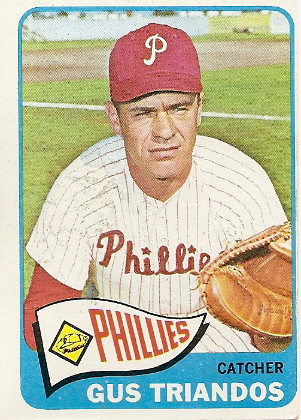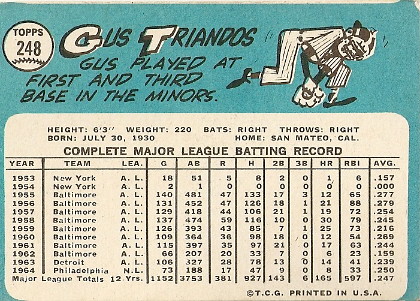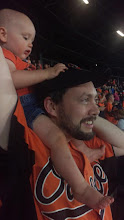
In Baltimore, Triandos had his chance to play and became one of the club's first stars. He was the only Oriole to be named on American League MVP ballots in both 1955 and 1956, and his batting, on-base, and slugging averages in the latter year (.279/.348/.462) would all be career bests, as would his 88 RBI. He led the power-bereft team in home runs by a comfortable margin in each of his first five seasons with the team, and totaled 142 in his eight years in orange and black. He made four consecutive All-Star teams from 1957-1959 (there were two games played in 1959), and his 30 longballs in 1958 are still a single-season record for an O's catcher.
Of course, 1958 was also the season that skipper Paul Richards first charged Triandos with the ingominious task of catching the unpredictable knuckleballs of future Hall of Fame pitcher Hoyt Wilhelm. Despite Wilhelm's successes in his four-plus seasons in Baltimore (including a 1958 no-hitter vs. the Yankees with Gus behind the plate, as well as an A.L. ERA title in 1959), the catcher dreaded the task of snagging - and chasing! - his battery mate's knuckler. Even with the oversized mitt that Richards created for him, Triandos still accumulated many of his 138 career passed balls (the eighth-highest career total) with Hoyt on the mound. Between his defensive trials and his impression that the local fans were especially fickle and critical (as put forth in an interview with Louis Berney for Tales from the Orioles Dugout), Gus was not entirely sorry to put Baltimore in his rear view mirror. He finally got that chance in 1963, when the Birds sent him to Detroit with Whitey Herzog, receiving catcher Dick Brown in return.
After an unspectacular campaign in Tigertown (.239/.315/.407), Triandos and future Hall of Fame pitcher and U.S. Senator Jim Bunning were swapped to the Phillies for outfielder Don Demeter and pitcher Jack Hamilton, a trade that would slant in Philadelphia's favor. The Phils' new duo teamed up for Bunning's perfect game on June 21, 1964 in brand-new Shea Stadium; Gus drove in two runs in support of his pitcher. In a part-time role that year, the catcher went deep eight times and took his share of walks. His performance fell off sharply in 1965 (.175 with two home runs in 54 games split between Philly and Houston), and he hung up his spikes after the Astros released him in August.
Fun fact: Gus played 1,206 consecutive games - the span of his thirteen-year career - without being caught stealing. He stole a base in his only career attempt, in the final game of the 1958 season against the Yankees. It was the second game of a doubleheader, and New York had already sewed up a trip to the World Series. The slow-footed catcher stroked a pinch-hit single to right field, and with Brooks Robinson at the plate, he swiped second base. The victims were rookie pitcher Zach Monroe and third-string backstop Darrell Johnson, who had been one of the other players in the aforementioned seventeen-player trade!



No comments:
Post a Comment